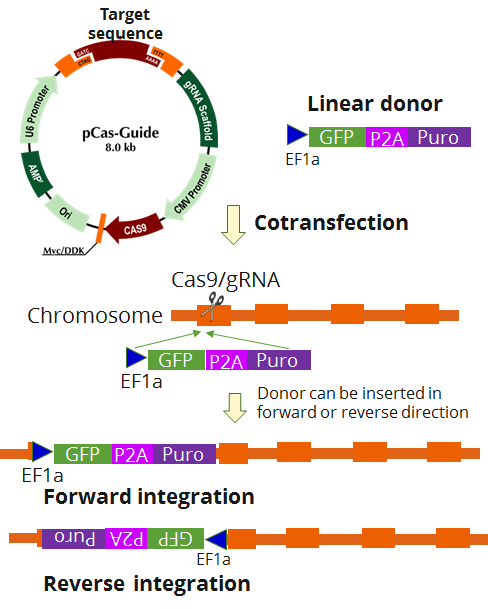Vasopressin (AVP) Human Gene Knockout Kit (CRISPR)
CAT#: KN416816
AVP - KN2.0, Human gene knockout kit via CRISPR, non-homology mediated.
KN2.0 knockout kit validation
KN416816 is the updated version of KN216816.
USD 1,290.00
2 Weeks*
Size
Other products for "Vasopressin"
Specifications
| Product Data | |
| Format | 2 gRNA vectors, 1 linear donor |
| Donor DNA | EF1a-GFP-P2A-Puro |
| Symbol | Vasopressin |
| Locus ID | 551 |
| Disclaimer | The kit is designed based on the best knowledge of CRISPR technology. The system has been functionally validated for knocking-in the cassette downstream the native promoter. The efficiency of the knock-out varies due to the nature of the biology and the complexity of the experimental process. |
| Reference Data | |
| RefSeq | NM_000490 |
| Synonyms | ADH; ARVP; AVP-NPII; AVRP; VP |
| Summary | 'This gene encodes a member of the vasopressin/oxytocin family and preproprotein that is proteolytically processed to generate multiple protein products. These products include the neuropeptide hormone arginine vasopressin, and two other peptides, neurophysin 2 and copeptin. Arginine vasopressin is a posterior pituitary hormone that is synthesized in the supraoptic nucleus and paraventricular nucleus of the hypothalamus. Along with its carrier protein, neurophysin 2, it is packaged into neurosecretory vesicles and transported axonally to the nerve endings in the neurohypophysis where it is either stored or secreted into the bloodstream. The precursor is thought to be activated while it is being transported along the axon to the posterior pituitary. Arginine vasopressin acts as a growth factor by enhancing pH regulation through acid-base transport systems. It has a direct antidiuretic action on the kidney, and also causes vasoconstriction of the peripheral vessels. This hormone can contract smooth muscle during parturition and lactation. It is also involved in cognition, tolerance, adaptation and complex sexual and maternal behaviour, as well as in the regulation of water excretion and cardiovascular functions. Mutations in this gene cause autosomal dominant neurohypophyseal diabetes insipidus (ADNDI). This gene is present in a gene cluster with the related gene oxytocin on chromosome 20. [provided by RefSeq, Nov 2015]' |
Documents
| Product Manuals |
| FAQs |
Resources
Other Versions
| SKU | Description | Size | Price |
|---|---|---|---|
| GA100381 | AVP CRISPRa kit - CRISPR gene activation of human arginine vasopressin |
USD 1,290.00 |
{0} Product Review(s)
0 Product Review(s)
Submit review
Be the first one to submit a review
Product Citations
*Delivery time may vary from web posted schedule. Occasional delays may occur due to unforeseen
complexities in the preparation of your product. International customers may expect an additional 1-2 weeks
in shipping.






























































































































































































































































 Germany
Germany
 Japan
Japan
 United Kingdom
United Kingdom
 China
China

